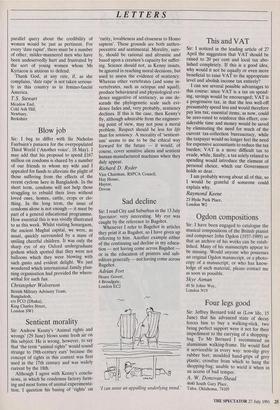Sentient morality
Sir: Andrew Kenny's 'Animal rights and wrongs' (29 June) blows some fresh air on this subject. He is wrong, however, to say that 'the term "animal rights" would sound strange to 19th-century ears' because the concept of rights in this context was first used in the 17th century and was widely current by the 18th. Although I agree with Kenny's conclu- sions, in which he condemns factory farm- ing and most forms of animal experimenta- tion, I question his basing of 'rights' on `rarity, lovableness and closeness to Homo sapiens'. These grounds are both anthro- pocentric and sentimental. Morality, sure- ly, should be rational and altruistic and based upon a creature's capacity for suffer- ing. Science should not, as Kenny insists, be ignored in reaching moral decisions, but used to assess the evidence of sentiency. Whereas other vertebrates (and some in- vertebrates, such as octopus and squid), produce behavioural and physiological evi- dence suggestive of sentiency, as one de- scends the phylogenetic scale such evi- dence fades and, very probably, sentiency declines. If this is the case, then Kenny's fly, although admirable from the engineer- ing point of view, may not pose a moral problem. Respect should be less for life than for sentiency. A morality of 'sentient- ism' seems to me to be the ethical way forward for the future — it would, of course, cover sensitive aliens and sentient human-manufactured machines when they duly appear.
Richard D. Ryder
Vice Chairman, RSPCA Council, Hay House, Haytor, Devon


















































 Previous page
Previous page